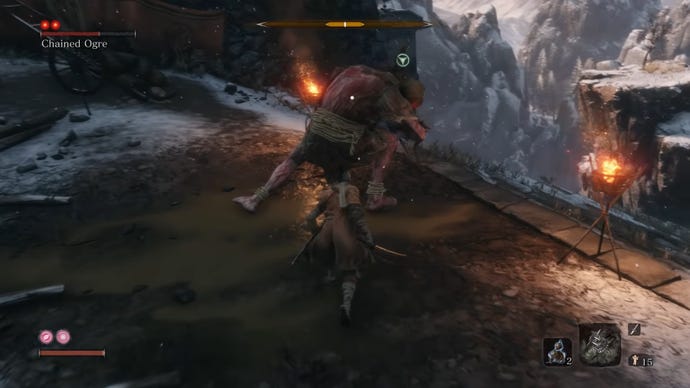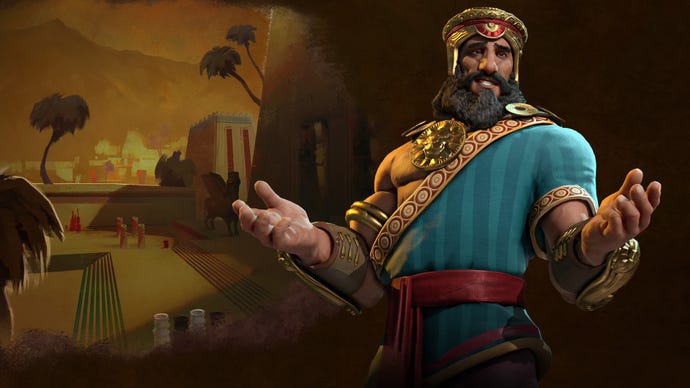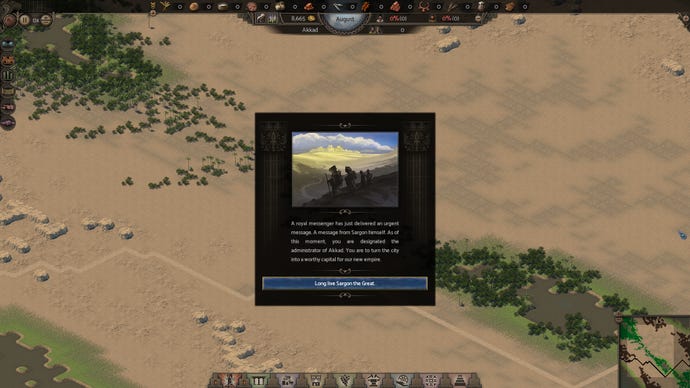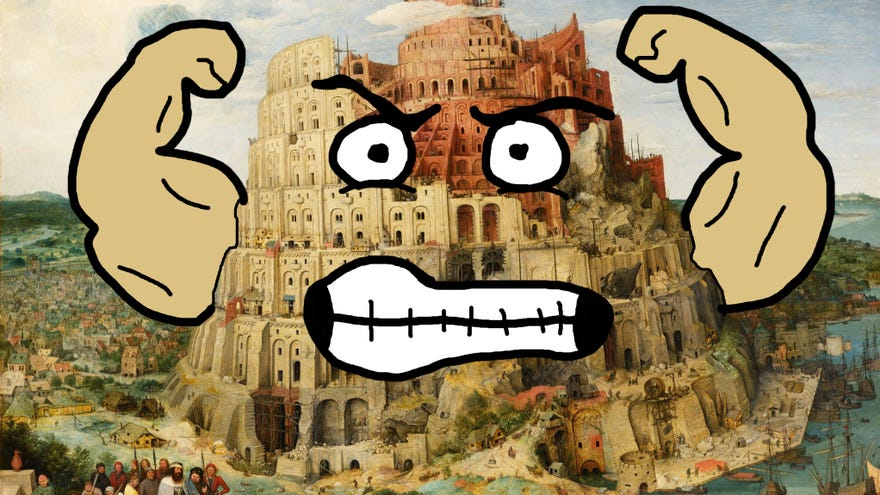I fought a boss that was five miles across, and took me 16 hours to beat
SARGON THE GREAT LAUGHS AT YOUR SO-CALLED "BOSSES"
Think you’re big then, do you, Whale Dad off of Final Fantasy X? Fancy yourself as a bit of a gigantus, hm? What about you, Half-Life missile silo monster? You reckon you’re fairly large, don’t you? Oh, and hark at Yhorm over here in Dark Souls 3, who’s awarded himself the title “The Giant”, like a child giving themselves a medal made from the lid of a milk bottle. Honestly, you make me laugh, the lot of you. Big bosses, eh? Big disappointments, more like. I used to think you were all impressive, of course. But this week, I beat a boss big enough to fill an entire river valley, and the scales fell from my eyes.
It took me five attempts to beat this monstrosity, and each one of ‘em was at least two hours long. Sixteen hours it took me, in the end, to come out triumphant. It was a duel of Homeric proportions - and the comparison is apt, given as how my adversary was made out of millions of tons of bricks, flesh, wheat, and other bronze age stuff. I am talking, of course, about the city of Akkad, which is the seventh mission in Mesopotamian city builder Nebuchadnezzar.You are now, no doubt, standing from your desk and roaring in furnace-hot outrage, that I have been such a deceptive little horror. “A city,” you bellow, so hard that one of your vocal chords snaps and pings out of your mouth like a rubber band, “cannot be a boss!”. You try to snarl the word “clickbait,” but it just comes out as a grating, painful honk; I have the stage once more.
I would have agreed with you, until recently. A boss in a game, surely, is much like a boss in real life: an entity of unreasonable power, which stops you from advancing through the world until you develop the strength or skill to annihilate it. In practice, this usually takes the form of “an extremely large bloke”.
But on last week’s Electronic Wireless Show, aka the RPS Podcast, we got talking about bosses, and I started wondering if the traditional definition of bossliness is getting a bit long in the tooth. I asked my co-hosts what they reckoned a boss actually was, in the broadest sense, and Matthew said something really interesting: that a boss is a test.By that, he meant a point you can’t progress past, without having reached a certain level of mastery in all the things the game has taught you to do thus far. That’s quite neat, I think. And it doesn’t invalidate anything we already think of as a boss, either. What, after all, is your classic vast bastard in a castle, who will turn you to Shippam’s unless you can roll about the place like a dropped pill and time your attacks to perfection, if not a test?

But this definition opens the doors of boss school so much wider, since it no longer requires a boss to be a single, malevolent entity. Hence, Akkad.
Nebuchadnezzar, in short, is a game about finding the most efficient placement for the physical components of a supply chain. Levels require you to reach certain populations of peasants, fancy peasants and sneering millionaires in your mesopotamian cities. You do this by arranging the buildings which acquire and process the goods they desire, and then seeing that they get distributed to peoples’ houses.

“BUT IT’S NOT THAT SIMPLE”, booms Sargon the Great, as he bursts through the wall with a hearty, malevolent laugh, and the smell of sandalwood billowing from his disconcertingly perfect torso. And indeed, he is right.
Nebuchadnezzar’s maps are smaller than they appear at first glance, meaning you have to be very canny with where you put things, and it gives you a punishingly slim margin of error, compared with other city builders.
If any of your citizens go without the things they love for even a minute, they will pack up and leave immediately, leaving you with a labour shortage - and therefore a diminished ability to make new things for your remaining populace. To complicate things further, increasing your population of peasants past a certain point requires goods that only sneering millionaires can make, and so on and so forth.

Look, you don’t need a blow by blow of every mechanic. Basically, unless you’re astonishingly efficient from the outset, you’re just waiting for the point where one false move pulls everything down with it, like when the idiot hobbit knocks the skeleton down the well in Gollum’s Big Movie.
And for whatever reason, the Akkad mission basically gives you a room made entirely of wells and skeletons, and unleashes a coach tour full of pissed-up hobbits into it. After five missions of running you through the basics, on maps that give you enough space to be a bit sloppy with your granaries and your brickworks, it gives you just what you need to succeed, and nothing more.
"The Akkad mission gives you a room made entirely of wells and skeletons, and unleashes a coach tour of pissed-up hobbits into it."
I went into that level casually guesstimating my ratio of wheat fields to bakeries. I came out of it, by contrast, knowing the exact production rate of every building in the game, and a degree-level understanding of fictional Mesopotamian logistics. In short, Akkad had given me a point I couldn’t progress past, without having reached a certain level of mastery in all the things the game had taught you to do thus far.
“IT WAS A BOSS!” announces Sargon, grinning through a beard like a sack of brown sugar, and with a twitch of his bicep, pops the head of the lion he has been holding in a headlock the whole time we’ve been talking.
Once again, Sargon is right. I approached Akkad exactly as I would a particularly punishing foe in a soulslike: I psyched myself up to have a fresh go each day, only to quit in frustration each time as whatever new strategy I’d come up with fell apart. But eventually, the accumulated weight of all the shit I’d eaten during my failures gave me the momentum I needed, to finally punch through that barrier.
Reader, it was a heck of a feeling. And now I am stuck on level nine.


